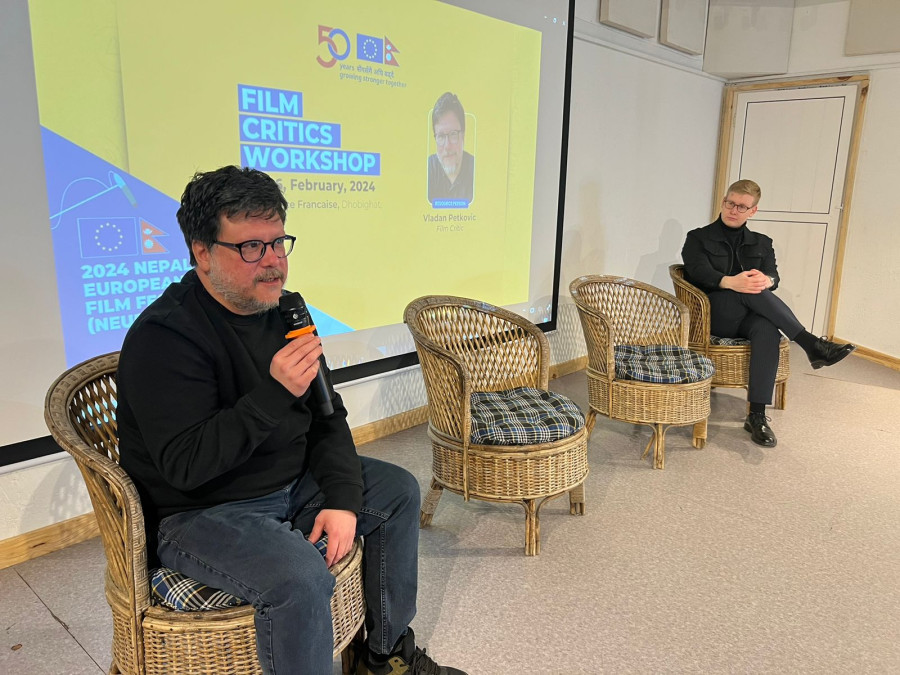Culture & Lifestyle
Understanding cinema and its critique
The NEUFF Workshop, organised by the Delegation of the EU to Nepal, helped emerging critics explore the intricacies of film writing.
Aarati Ray
Writing a film review can be challenging. Finding the balance between objectivity and subjectivity, appreciating and criticising, and telling the truth without angering the audience or filmmakers is hard to crack.
Moreover, there are few opportunities in Nepal where cenophiles, movie critics or journalists get the chance to learn more about the dynamics and nuances of film writing. Seeking to address this gap, the Delegation of the European Union to Nepal organised a three-day Film Critics Workshop from February 24 to 26 at Alliance Francaise in Dhobighat, Lalitpur. The workshop, a precursor to the upcoming 2024 Nepal-European Union Film Festival (NEUFF) in mid-March, aimed to enhance the understanding of cinema among emerging critics in Nepal. A noteworthy aspect of the workshop was the participation of film critic Vladan Petkovic as a resource person.
Petkovic, a seasoned Serbian film critic and journalist, has extensive experience conducting film critic workshops globally. He works as a correspondent at Screen Daily, covering the Balkans, holds senior positions at Cineuropa and is a contributing editor for the International Documentary Film Festival Amsterdam (IDFA) website.
Mohan Rai, director of Middleway Films and festival manager for NEUFF 2024, expressed that the idea for the workshop stemmed from years of collaboration with journalists at film festivals. Suggestions and discussions about conducting workshops for film journalists and aspiring critics led to the organisation of this event.
From 32 applicants, eight participants were selected through an open call. The workshop commenced with a general session on February 24, attended by 73 senior filmmakers, journalists, movie critics, actors and film enthusiasts.
During this session, Petkovic, sharing his own journey in film criticism, stated, “There should be elements of understanding and compassion in film criticism otherwise, it’s more about criticism and less about cinema.” The ensuing Q&A session sparked an interesting discussion on contemporary film criticism, its impact on the film industry, and its role in society.
After completing the general session on the first day, a film titled ‘Lola’ was screened for the eight participants and they were asked to submit a review of the movie.
The second day involved a group editing session where Petkovic created an environment for participants to learn from each other’s strengths and weaknesses while editing their reviews together.
On the final day, Petkovic had one-on-one editing sessions with participants, spending 40-45 minutes with each person to revise and provide helpful feedback on their reviews.
The workshop ended with the screening of the Nepali short film ‘The Mirage’, followed by participants discussing and critiquing the movie using the techniques and lessons suggested by Petkovic.
Bibek Bhattarai, a freelancer who writes movie scripts, was pleasantly surprised that the workshop exceeded his expectations. Having never received professional training in writing before, he felt fortunate to have the opportunity to learn from someone as well-versed as Petkovic.
Bhattarai expected a brief interaction with Petkovic, but to his delight, Petkovic provided one-on-one sessions and detailed feedback on every aspect of their writing, explaining where things could go wrong. He shared that he plans to use Petkovic’s tips in his future work and aims to avoid making scripts too generic.
Sriju Saral, yet another freelancer who writes for NepalKhabar reflecting on her experience, shared that the workshop helped her identify the strengths and weaknesses in her writing, and it has also changed her way of viewing cinema. Additionally, it taught her to focus on the underlying elements of cinemas as well.
Another participant, Prasun Sangroula, a journalist at OnlineKhabar, highlighted the value of the workshop, expressing that such workshops should occur more often. This way, more writers, critics, and journalists can have the opportunity to benefit from them.
Rai believes workshops like these are important to raise awareness about Nepali cinema, and to bring the culture of appreciation and healthy criticism and discourse related to movie making and movies and hopes to continue such workshops.
Petkovic shared that he had a rewarding experience during the workshop. Although he has conducted numerous workshops before, this was his first in this part of the world, specifically in Nepal and South Asia.
He mentioned that during the workshop, he gained a better understanding of film culture in Nepal and the general culture, given that movies often revolve around cultural themes. Expressing his desire to return to Nepal for more workshops, he advised, “Read a lot, watch a lot of movies, but don’t just read reviews—also read books.”
The workshop proved beneficial for the participants as it not only explored different approaches to writing but also delved into how various media outlets handle different film forms and genres. It also examined how cultural differences influence people’s perception of film and discussed the similarities and discrepancies in film industries across different continents and regions.




 9.6°C Kathmandu
9.6°C Kathmandu

.jpg&w=200&height=120)













